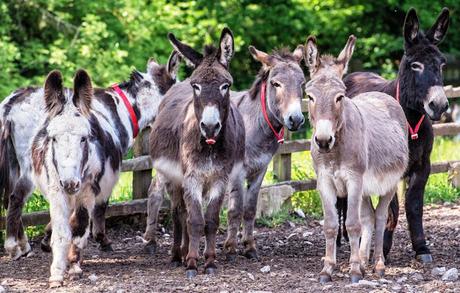Sure you have read this interesting fable of father, son and donkey. On the move, father and son walked with a donkey. First the father sat – people commented that the elder making the young boy walk, while he sat on donkey; when son sat, people commented – that youth is cruel in making his father walk- both of them sat on donkey – people said that cruelty is meted out to the poor animal ! – and they carried the animal !!! Moral : Never try to please all.
In Economics according to the theory of Demand and Supply, when demand is more and supply is scarce, the price increases and suppliers tend to provide more!

Equus africanus asinus, a domesticated member of the horse family, Equidae – is found in the heart of Chennai too …. In villages, it could be a common sight – a few years ago, nearer Vivekananda College in Sivasami Salai, one can find a few donkeys, an animal used extensively by launderers. A male donkey or ass is called a jack, a female a jenny or jennet. As beasts of burden and companions, asses have worked together with humans for millennia. Donkey’s work often goes unrecognized be it in Office or for the original animals.
Humans owe a lot to the humble donkey. Domesticated for more than five millennia, they have been used for everything from farming to warfare. In this advanced industrialised World too, the poorest communities still rely on donkeys for their day-to-day needs. A couple of years back, had posted about the little country – Burkina Faso and its donkey trade to far-off China.
Pakistan is nearly broke with the drying up of foreign cash reserves and mounting external debt. Earlier in February, China had come forward with a loan offer of 42.5 billion and now, in return, Pakistan will be exporting donkeys to its "all-weather ally". Pakistan, which has the third largest donkey population in the world, will export the animal to China, opening the avenue to earn millions from the trade, according to a media report. Donkeys are highly prized in China, especially for their hide which is used to manufacture traditional Chinese medicines. Gelatin made from donkey skin has been long considered to have medicinal properties in China, traditionally being thought to nourish the blood and enhance the immune system.
Pakistan has seen an increase of 100,000 more donkeys within a year. According to Economic Survey 2021, the number of donkeys has increased from 5.5 million to 5.6 million during the fiscal year 2020-2021. The survey also revealed that there was a 1.2 million increase in the number of buffalos in the country. Meanwhile, the number of sheep has increased from 31.2 million to 31.5 million after an increase of 400,000 in a year. The latest animal census in Pakistan confirmed that the number of donkeys in that country is going up. In contrast, the last animal census in India indicated in 2019 that the number of donkeys in this country is declining sharply.
Curiously both the increase in Pakistan and the decline in India are attributed to the high demand of donkey hide in China. It is apparently used to make a gelatine which goes into making a traditional Chinese medicine. In addition, donkey meat is said to be in high demand in parts of Andhra Pradesh, where it is believed to enhance virility. Pakistan’s newspaper Dawn reported this week, “Donkey population in Pakistan increased by 100,000 during the current fiscal year of 2020-21 to reach 5.6 million. However, the population growth of horses and mules remained stagnant, the Pakistan Economic Survey 2020-21 revealed.”
Donkeys are being exported to China, the report added, where it is highly priced ‘especially for their hide which is used to manufacture traditional Chinese medicines. Gelatin made from donkey skin is believed to have medicinal properties, traditionally thought to nourish the blood and enhance the immune system.
In India, a major reason is said to be the decline in the use of donkeys for short-distance transport as carriers or cart-pullers. The poorest donkey-rearing communities are also said to have migrated to other occupations and they are unable to provide for the donkeys any longer. Despite their dwindling numbers, donkeys continue to be deployed in large numbers in sectors such as brick kilns, construction, tourism, agriculture and transportation of goods and people. Since donkeys have mostly disappeared from Andhra Pradesh, donkeys are being brought in from Rajasthan, Uttar Pradesh, Tamil Nadu, Maharashtra and Karnataka.
Donkey meat is not categorised as an “animal food” under the Food Safety and Standards Authority of India’s Food Safety and Standards, 2011, making its slaughter and consumption illegal.
A Donkey Drop is a delivery bowled with a very high flight before it bounces. One of the reasons for a donkey drop is when the ball slips out of the hand of the bowler, leading to it popping up high in the air and landing in front of the batsman.
With regards – S. Sampathkumar15th June 2021.
Pic credit : twitter page of Primrose donkey sanctuary.

